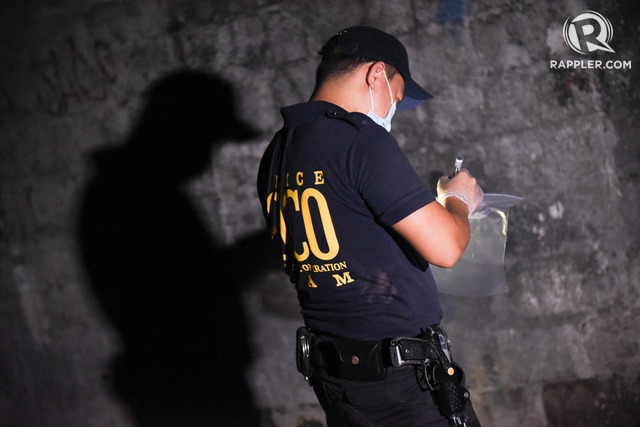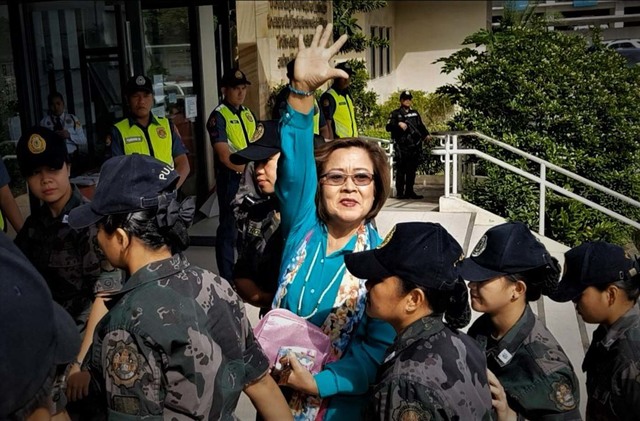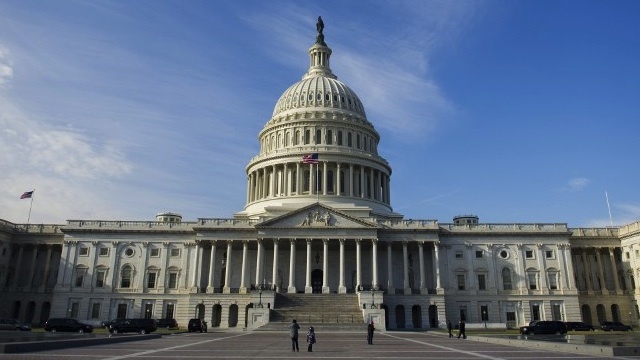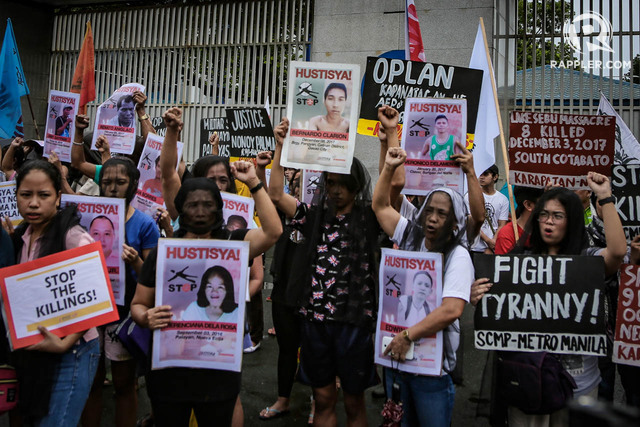Answers to 4 questions to get you up to speed on 2 proposed measures to bar Philippine officials from entering the United States and freezing their assets there

DRUG WAR. Police officials investigate the crime scene of a buy-bust operation. File photo by Alecs Ongcal/Rappler
Lawmakers in the United States have started taking action to sanction Philippine officials linked to human rights violations under the Duterte administration and the detention of opposition Senator Leila de Lima.
In particular, US Senators have proposed legislation that sets in motion processes for imposing travel restriction and financial sanctions on Philippine officials found to have been involved in De Lima's imprisonment and extrajudicial killings seen under President Rodrigo Duterte's war on drugs.
The proposed sanctions were included in a resolution adopted by the US Senate committee on foreign relations last December 11 and in an separate amendment to the US government's proposed budget for 2020.
Here's what we know so far from the movement of these pieces of legislation:
What are the sanctions and how were they proposed? There are currently two separate measures through which sanctions against Philippine officials linked to killing in the drug war and De Lima's detention are being proposed.
The first of these is an amendment in the 2020 state and foreign operations appropriations bill tackled by the US Senate appropriations committee. The amendment proposes denying entry to those involved in the detention De Lima. It was included in the bill's general provisions, which the Senate appropriations committee approved last September.
Specifically, the section "Prohibition on Entry" said the US Secretary of State "shall apply subsection (c) to foreign government officials about whom the Secretary has credible information have been involved in the wrongful imprisonment of.... Senator Leila de Lima who was arrested in the Philippines in 2017."
The provision calls for the same action against officials of the Egyptian government for the "wrongful detention" of an American citizen and government officials of Turkey, Egypt, or Saudi Arabia over "wrongful detention of locally employed staff of a U.S. diplomatic mission or a U.S. citizen or national."

IMPRISONED. Senator Leila de Lima remains in prison for over 2 years over drug charges she asserts were fabricated by the Duterte government. Photo from the office of Senator Leila de Lima
The second is US Senate resolution 142, which condemned De Lima's imprisonment and denounced arrest and detention of human rights defenders and political leaders who have "exercised their right to freedom of expression." This includes the harassment of media, particularly Rappler and its CEO Maria Ressa.
The Senate resolution is most notable for invoking the Global Magnitsky Act, which is the US' law that gives its executive branch the power to impose visa and travel restrictions and financial sanctions on human rights violators anywhere in the world. (READ: Why the Global Magnitsky Act matters to the Philippines)
According to the Senate resolution, proposed Global Magnitksy sanctions cover the following parties:
Members of the security forces and official of the Government of the Philippines responsible for exrtajudicial killings
Officials of the Government of the Philippines responsible for orchestrating the arrest and prolonged detention of Senator De Lima
If sanctions are imposed, affected officials may be denied US visas and may have their bank accounts and assets in America frozen.

TAKING ACTION. US Senators push for sanctions against Philippine officials involved in the imprisonment of Senator Leila de Lima and extrajudicial killings seen in the Duterte administration's drug war. Photo by AFP/Saul Loeb
In particular, US Senators have proposed legislation that sets in motion processes for imposing travel restriction and financial sanctions on Philippine officials found to have been involved in De Lima's imprisonment and extrajudicial killings seen under President Rodrigo Duterte's war on drugs.
The proposed sanctions were included in a resolution adopted by the US Senate committee on foreign relations last December 11 and in an separate amendment to the US government's proposed budget for 2020.
Here's what we know so far from the movement of these pieces of legislation:
What are the sanctions and how were they proposed? There are currently two separate measures through which sanctions against Philippine officials linked to killing in the drug war and De Lima's detention are being proposed.
The first of these is an amendment in the 2020 state and foreign operations appropriations bill tackled by the US Senate appropriations committee. The amendment proposes denying entry to those involved in the detention De Lima. It was included in the bill's general provisions, which the Senate appropriations committee approved last September.
Specifically, the section "Prohibition on Entry" said the US Secretary of State "shall apply subsection (c) to foreign government officials about whom the Secretary has credible information have been involved in the wrongful imprisonment of.... Senator Leila de Lima who was arrested in the Philippines in 2017."
The provision calls for the same action against officials of the Egyptian government for the "wrongful detention" of an American citizen and government officials of Turkey, Egypt, or Saudi Arabia over "wrongful detention of locally employed staff of a U.S. diplomatic mission or a U.S. citizen or national."

IMPRISONED. Senator Leila de Lima remains in prison for over 2 years over drug charges she asserts were fabricated by the Duterte government. Photo from the office of Senator Leila de Lima
The second is US Senate resolution 142, which condemned De Lima's imprisonment and denounced arrest and detention of human rights defenders and political leaders who have "exercised their right to freedom of expression." This includes the harassment of media, particularly Rappler and its CEO Maria Ressa.
The Senate resolution is most notable for invoking the Global Magnitsky Act, which is the US' law that gives its executive branch the power to impose visa and travel restrictions and financial sanctions on human rights violators anywhere in the world. (READ: Why the Global Magnitsky Act matters to the Philippines)
According to the Senate resolution, proposed Global Magnitksy sanctions cover the following parties:
Members of the security forces and official of the Government of the Philippines responsible for exrtajudicial killings
Officials of the Government of the Philippines responsible for orchestrating the arrest and prolonged detention of Senator De Lima
If sanctions are imposed, affected officials may be denied US visas and may have their bank accounts and assets in America frozen.

TAKING ACTION. US Senators push for sanctions against Philippine officials involved in the imprisonment of Senator Leila de Lima and extrajudicial killings seen in the Duterte administration's drug war. Photo by AFP/Saul Loeb
Who proposed the sanctions? US Senators Richard Durbin (Illinois) and Patrick Leahy (Vermont) had pushed for the proposed amendment to the 2020 state and foreign operations appropriations bill, which was adopted by both the Senate and House of Representatives.
Meanwhile, US Senate resolution 142 was authored by US Democrat Senator Edward Markey (Massachusetts) and filed with Senators Durbin, Marco Rubio (Florida), Marsha Blackburn (Tennessee), and Chris Coons (Delaware).
Why were they sought? Sanctions were proposed in line with lawmakers' urging the Philippine government to release De Lima, who has been imprisoned for over 2 years now, on drug charges she asserts were fabricated by the government.
"For over 1,000 days now, Senator De Lima has languished in prison. Her crime: standing for human rights and good governance in the Philippines...[The] passage of my resolution...demonstrates broad support for accountability in her case and with others," Markey tweeted last December 12.
The sanctions were also proposed to aid in exacting accountability for the violation of human rights of the victims of extrajudicial killings.

FIGHT FOR JUSTICE. Relatives of victims of extrajudicial killings along with human rights groups demand justice for their slain kin. File photo by Jire Carreon/Rappler
Meanwhile, US Senate resolution 142 was authored by US Democrat Senator Edward Markey (Massachusetts) and filed with Senators Durbin, Marco Rubio (Florida), Marsha Blackburn (Tennessee), and Chris Coons (Delaware).
Why were they sought? Sanctions were proposed in line with lawmakers' urging the Philippine government to release De Lima, who has been imprisoned for over 2 years now, on drug charges she asserts were fabricated by the government.
"For over 1,000 days now, Senator De Lima has languished in prison. Her crime: standing for human rights and good governance in the Philippines...[The] passage of my resolution...demonstrates broad support for accountability in her case and with others," Markey tweeted last December 12.
The sanctions were also proposed to aid in exacting accountability for the violation of human rights of the victims of extrajudicial killings.

FIGHT FOR JUSTICE. Relatives of victims of extrajudicial killings along with human rights groups demand justice for their slain kin. File photo by Jire Carreon/Rappler
What's the status? Travel sanctions in the US government's 2020 budget may be approved as early as the end of December 2019, with the pending bill currently up for President Donald Trump's signature.
Once Trump signs the measure, the US Secretary of State – who, in this case is Secretary Mike Pompeo, will prohibit from entering the US, Philippine officials about whom he has "credible information [to] have been involved in the wrongful imprisonment" of De Lima.
Meanwhile, the earliest any action can be taken on the Senate resolution invoking the Global Magnitsky Act is Monday, December 23, when it will be tackled for the entire US Senate's adoption.
If no action is taken on the measure by the end of this year, it will be carried over to January 2020. But by then among urgent concerns to be tackled by lawmakers include the high-stakes impeachment trial of President Trump.
https://www.rappler.com/nation/247735-united-states-proposed-sanctions-vs-philippine-officials-drug-war
Once Trump signs the measure, the US Secretary of State – who, in this case is Secretary Mike Pompeo, will prohibit from entering the US, Philippine officials about whom he has "credible information [to] have been involved in the wrongful imprisonment" of De Lima.
Meanwhile, the earliest any action can be taken on the Senate resolution invoking the Global Magnitsky Act is Monday, December 23, when it will be tackled for the entire US Senate's adoption.
If no action is taken on the measure by the end of this year, it will be carried over to January 2020. But by then among urgent concerns to be tackled by lawmakers include the high-stakes impeachment trial of President Trump.
https://www.rappler.com/nation/247735-united-states-proposed-sanctions-vs-philippine-officials-drug-war

No comments:
Post a Comment
Note: Only a member of this blog may post a comment.